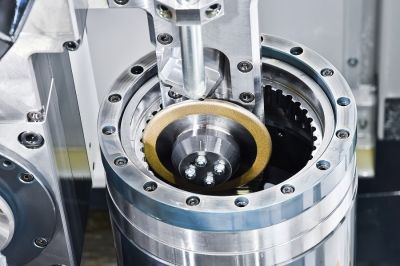Liebherr Offers Solution for Robotics and Special Applications in Gearing
Precision gears for industrial applications have to deliver a top-class performance. In order for a robotic arm to achieve precise gripping movements, for example, extremely small and lightweight components are required that must also provide enormous transmission ratios. Cycloidal drives or Harmonic Drive gearboxes are used in particular. These simply constructed gearboxes are characterized by their precise transmission of motion, zero backlash and high transmission ratios, and they are also free from wear and tear. Furthermore, they are very compact in size. In order to manufacture these demanding parts, Liebherr has developed solutions and made its range of processes more flexible.
Dimensional stability, excellent surface quality, and high profile and pitch quality must all be ensured in cycloidal gears, and the rollers must fit perfectly with the inner ring. New from Liebherr and specially developed for cycloid gearing: externally toothed cams can now also be produced using single or precisely paired double clamping by means of generating grinding. Thus, depending on the number of pieces required, not only is profile grinding available to users but also a further grinding method for the cam discs.
For this application, generating grinding offers a number of advantages over profile grinding such as higher pitch accuracy, improved dimensional stability and an even profile over the whole cam disc, thanks to the improved wear distribution of the grinding worm. “By avoiding the undesirable ‘steps’ in the profile, we have been able to improve the quality even more,” said Dr. Andreas Mehr, who is responsible for gear grinding and gear shaping at Liebherr. Due to the faster grinding times, generating grinding is comparatively less expensive.
For internal profile grinding of the roller seats on the inner ring, a grinding wheel had to be developed that is capable of grinding a full radius. Liebherr succeeded in doing this by producing its own CBN grinding wheels with electroplated bonds that are dressing-free and wear-resistant. This ensures maximum process stability and process quality. The user is also more flexible when changing from external to internal grinding on one machine: changeover is possible in less than 30 minutes.
The gear teeth of the Harmonic Drive gearbox presented another manufacturing challenge. Here the load is distributed over a large number of tiny teeth, which, in extreme cases, are so tiny that they are barely visible to the naked eye. “When it comes to gear hobbing and gear shaping, we are sometimes at the limits of what is both technically feasible and still measurable” said Dr. Oliver Winkel, head of technology application at Liebherr. “But when it comes to extreme requirements in the production, handling and measurement of such small-modus components, Liebherr is the perfect partner.”
Liebherr sees itself as a solution provider for the growing performance requirements resulting from the boom in automation, and is constantly working to expand its range of manufacturing processes. In the future, for example, the internal gear of the circular spline for Harmonic Drive gearbox can also be produced by gear skiving, like on Liebherr’s LK 180 – another option for greater flexibility and efficiency. This also applies to other special cases, for which there may not yet be a solution already on the market but which will be developed in cooperation with the customer.
Liebherr also sees itself as a competent partner when it comes to meeting the growing demand for components for robotic applications and increasing productivity. Winkel explains: “Whether setting up a new production from scratch, supplying machines, defining processes, training employees or providing service and support,” Winkel said. “We have the expertise to advise and accompany our customers throughout the entire process.”





